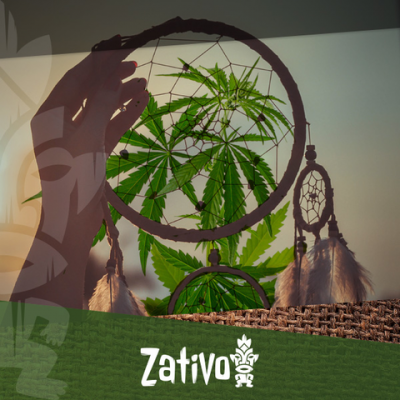Don't have an account?
Register NowYou have to add to cart at least 5 bottles or any program to make checkout.
- BlogHow Does Cannabis Affect Your Sleep?
How Does Cannabis Affect Your Sleep?
Published: March 14th, 2017
Categories:
Medical Cannabis
Many people use cannabis to help them sleep. That said, pot does more than help you get to sleep. In fact, the entire sleep process is affected by cannabis use. When you sleep, you are in fact cycling between different stages of a four-stage process. Marijuana can affect both the duration and intensity of each of these stages.
The first stage of sleep – the process of falling asleep, takes about 7 minutes, although it can take longer if someone is experiencing stress, anxiety or pain. The second stage is "light sleep", during which the sleeper is easily woken. Stages three and four are referred to as “slow wave sleep” or SWS. These two stages, sometimes lumped together as one, are the most restorative of the phases. Marijuana use lengthens this period.
Early research on the drug in the 1970s as a sleep aid compared the effect of THC on sleep as similar to those induced by the drug lithium.
Most of the sleep studies conducted during this period of time (which also coincided with a period when the Nixon Administration in particular was demonizing the use of marijuana) were inconclusive on the use of the drug and why it worked. These days, of course, there is far more understanding of how cannabinoids work - starting with how THC works in the brain and body, as well as how marijuana helps you to rest, relax and of course, sleep.
These days, the evidence continues to mount that the drug is an effective sleep aid for many users – albeit for differing reasons. A 2013 study, funded by the U.S. government and published in the American Journal of Addiction, found that THC is “significantly associated with shorter sleep latency as well as less difficulty falling asleep”.
Unlike other sleep aids, including sleeping pills, cannabis also has far fewer negative effects – starting with the fact, that it is not addictive.
WHY DOES CANNABIS ACT AS A SLEEP AID?
There are several reasons actually – starting with the fact, that the endocannabinoid system in the human body plays a large role in regulating sleep. The first is of course, that marijuana is a great antidote to stress and acts as a relaxer. In addition, sedating pain and removing anxiety are a good recipe for allowing the body to rest.
However, the reason that marijuana may also allow people to maintain a deep and restful sleep, is that marijuana appears to also inhibit REM sleep and dreaming. Dreams occur during the final stage of the sleep cycle. Ingesting cannabis before you fall asleep tends to produce a shorter REM cycle, which means you won’t have as many dreams and they won’t be as vivid. This means for people who suffer PTSD nightmares or disturbing dreams, this period of the sleep cycle is not only not as lengthy, but the images experienced are not as disturbing during either sleep or when awake.
MARIJUANA USE APPEARS TO DIRECTLY HELP SLEEP DISORDERS
Preclinical studies also indicate, that marijuana might also aid in improving conditions like sleep apnea, that interrupt breathing during sleep. There have been multiple studies showing the functional role, that cannabinoids play in maintaining respiratory stability during sleep – which seem to show, that serotonin agonists like cannabinoids, can reduce sleep-disordered respiration.
According to a 2013 study published in Frontiers in Psychiatry, this is caused directly by ingestion of THC and its interaction with the brain. This study actually used Dronabinol, which is pure (if synthetic THC). This means, that other factors (including interaction of terpenes for example) are not at play, specifically in at least this aspect of improving sleep.
Marijuana can also help people overcome other issues and disorders, that lead to a disordered or less than satisfactory night’s sleep. These include restless leg syndrome, narcolepsy, parasomnias (such as nightmares, sleepwalking and talking in sleep) and of course good old insomnia.
WHAT KIND OF MARIJUANA WORKS BEST?
Indica strains, by far, are the best sleep aids. This is because they create a body “high”, that is profoundly relaxing. Research to date has yet to come up with a definitive answer why this is the case – although some theorize, that it might be caused by the terpene content in such strains. People who want to use marijuana as a sleep aid should experiment with these kinds of strains first – and also try to stay away from sativa strains and hybrids as these may in fact create the opposite effect.
It is also apparent that aged cannabis also makes you sleepier. This is caused by the degradation of THC over time. The aging process converts THC into a sedating chemical known as cannabinol or CBN (not to be confused with CBD).
WHAT ARE THE RISKS OF USING MARIJUANA AS A SLEEP AID?
Users who report regular use of the drug to sleep also report mild to uncomfortable effects of cessation of use. These symptoms, which also mimic nicotine withdrawal, include an inability to get to sleep or insomnia for a period of several days to several weeks, strange and vivid dreams, and irritability when awake.





